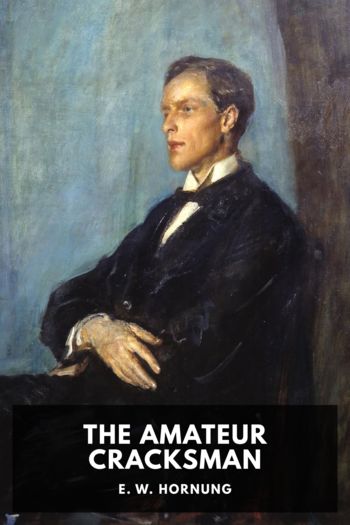The Amateur Cracksman, E. W. Hornung [black authors fiction txt] 📗

- Author: E. W. Hornung
Book online «The Amateur Cracksman, E. W. Hornung [black authors fiction txt] 📗». Author E. W. Hornung
“By Jove!” I cried next instant.
The canvas was in its place among the maps!
“Thought it would knock you,” said Craggs, drawing it out and unrolling it for my benefit. “Grand thing, ain’t it? Wouldn’t think it had been painted two hundred and thirty years? It has, though, my word! Old Johnson’s face will be a treat when he sees it; won’t go bragging about his pictures much more. Why, this one’s worth all the pictures in Colony o’ Queensland put together. Worth fifty thousand pounds, my boy—and I got it for five!”
He dug me in the ribs, and seemed in the mood for further confidences. My appearance checked him, and he rubbed his hands.
“If you take it like that,” he chuckled, “how will old Johnson take it? Go out and hang himself to his own picture-rods, I hope!”
Heaven knows what I contrived to say at last. Struck speechless first by my relief, I continued silent from a very different cause. A new tangle of emotions tied my tongue. Raffles had failed—Raffles had failed! Could I not succeed? Was it too late? Was there no way?
“So long,” he said, taking a last look at the canvas before he rolled it up—“so long till we get to Brisbane.”
The flutter I was in as he closed the case!
“For the last time,” he went on, as his keys jingled back into his pocket. “It goes straight into the strongroom on board.”
For the last time! If I could but send him out to Australia with only its legitimate contents in his precious map-case! If I could but succeed where Raffles had failed!
We returned to the other room. I have no notion how long he talked, or what about. Whiskey and soda-water became the order of the hour. I scarcely touched it, but he drank copiously, and before eleven I left him incoherent. And the last train for Esher was the 11:50 out of Waterloo.
I took a hansom to my rooms. I was back at the hotel in thirteen minutes. I walked upstairs. The corridor was empty; I stood an instant on the sitting-room threshold, heard a snore within, and admitted myself softly with my gentleman’s own key, which it had been a very simple matter to take away with me.
Craggs never moved; he was stretched on the sofa fast asleep. But not fast enough for me. I saturated my handkerchief with the chloroform I had brought, and laid it gently over his mouth. Two or three stertorous breaths, and the man was a log.
I removed the handkerchief; I extracted the keys from his pocket. In less than five minutes I put them back, after winding the picture about my body beneath my Inverness cape. I took some whiskey and soda-water before I went.
The train was easily caught—so easily that I trembled for ten minutes in my first-class smoking carriage—in terror of every footstep on the platform, in unreasonable terror till the end. Then at last I sat back and lit a cigarette, and the lights of Waterloo reeled out behind.
Some men were returning from the theatre. I can recall their conversation even now. They were disappointed with the piece they had seen. It was one of the later Savoy operas, and they spoke wistfully of the days of Pinafore and Patience. One of them hummed a stave, and there was an argument as to whether the air was out of Patience or the Mikado. They all got out at Surbiton, and I was alone with my triumph for a few intoxicating minutes. To think that I had succeeded where Raffles had failed!
Of all our adventures this was the first in which I had played a commanding part; and, of them all, this was infinitely the least discreditable. It left me without a conscientious qualm; I had but robbed a robber, when all was said. And I had done it myself, single-handed—ipse egomet!
I pictured Raffles, his surprise, his delight. He would think a little more of me in future. And that future, it should be different. We had two thousand pounds apiece—surely enough to start afresh as honest men—and all through me!
In a glow I sprang out at Esher, and took the one belated cab that was waiting under the bridge. In a perfect fever I beheld Broom Hall, with the lower story still lit up, and saw the front door open as I climbed the steps.
“Thought it was you,” said Raffles cheerily. “It’s all right. There’s a bed for you. Sir Bernard’s sitting up to shake your hand.”
His good spirits disappointed me. But I knew the man: he was one of those who wear their brightest smile in the blackest hour. I knew him too well by this time to be deceived.
“I’ve got it!” I cried in his ear. “I’ve got it!”
“Got what?” he asked me, stepping back.
“The picture!”
“What?”
“The picture. He showed it me. You had to go without it; I saw that. So I determined to have it. And here it is.”
“Let’s see,” said Raffles grimly.
I threw off my cape and unwound the canvas from about my body. While I was doing so an untidy old gentleman made his appearance in the hall, and stood looking on with raised eyebrows.
“Looks pretty fresh for an Old Master, doesn’t she?” said Raffles.
His tone was strange. I could only suppose that he was jealous of my success.
“So Craggs said. I hardly looked at it myself.”
“Well, look now—look closely. By Jove, I must have faked her better than I thought!”
“It’s a copy!” I cried.
“It’s the copy,” he answered. “It’s the copy I’ve been tearing all over





Comments (0)